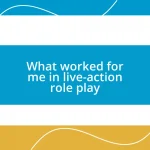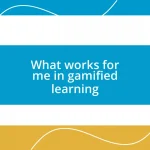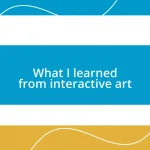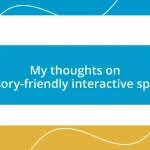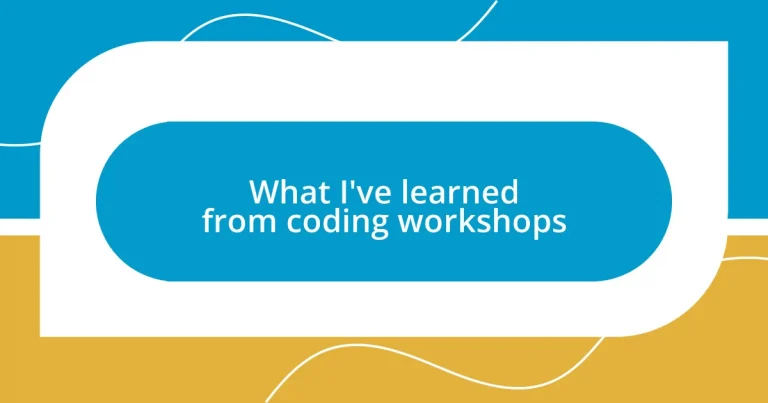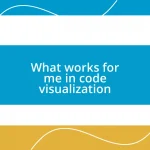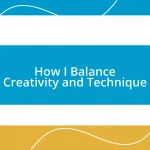Key takeaways:
- The sense of community in workshops fosters collaboration and enhances the learning experience among coders of all levels.
- Participating actively and asking questions during workshops leads to deeper understanding and breaks down barriers to learning.
- Embracing a continuous learning mindset, including viewing failures as opportunities for growth, is crucial for personal and professional development in coding.
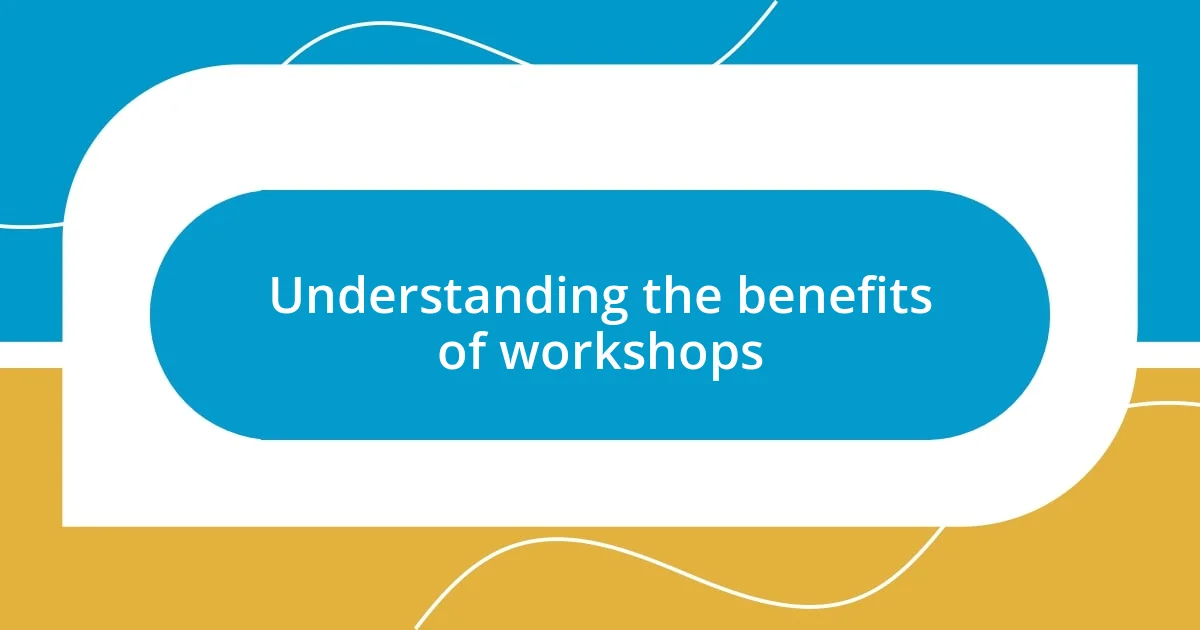
Understanding the benefits of workshops
When I first attended a coding workshop, I was struck by the immediate sense of community. It was fascinating to see beginners and seasoned coders alike, all sharing insights and encouragement. Have you ever felt that rush of collaboration? It’s a boost that you simply can’t replicate when learning solo.
Workshops offer structured learning that can be incredibly valuable. I remember struggling with a coding concept for weeks on my own, but in just one session, a mentor broke it down into manageable pieces. It made me wonder how many other roadblocks I could dismantle with a little guidance. The clarity a workshop provides is like having a map when you’re lost in an unfamiliar place.
One of the most underrated benefits of workshops is the opportunity for hands-on practice. I recall a session where we were all coding away on real projects. The thrill of seeing my code come to life in a supportive environment was exhilarating. Don’t you think it’s amazing how much more we learn when we can apply our skills in real-time? These workshops have a way of transforming anxiety about coding into something invigorating and fulfilling.
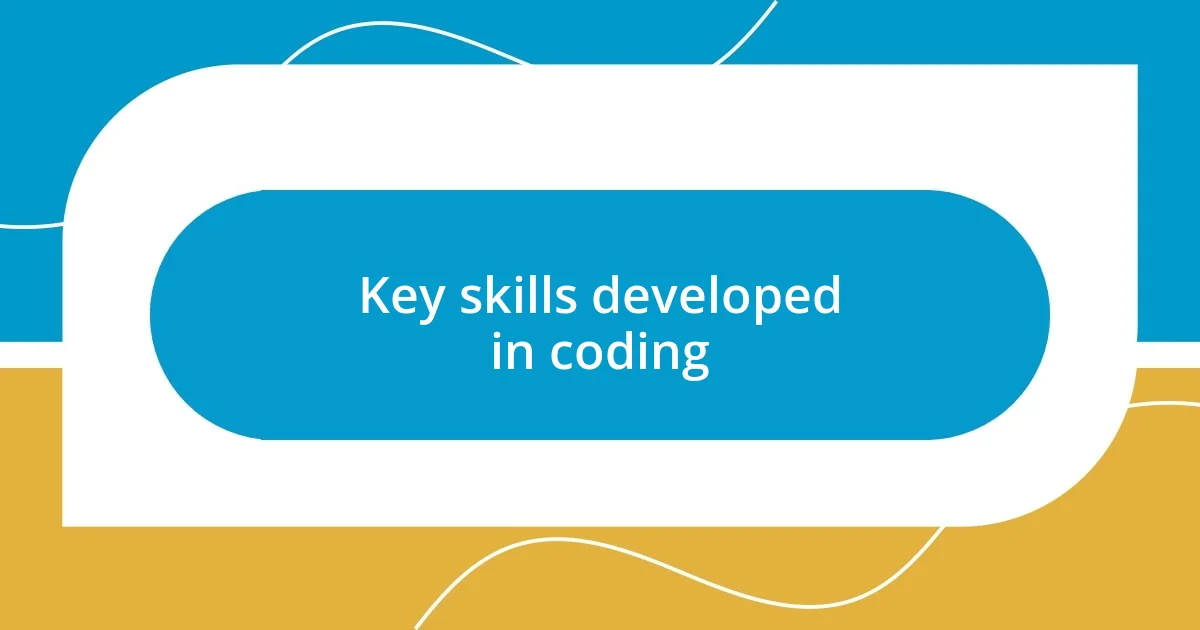
Key skills developed in coding
The coding workshops I attended really sharpened my problem-solving skills. I remember facing a particularly challenging debugging task, and it was in that moment I realized how crucial analytical thinking is in coding. By breaking down the problem into smaller components, I learned to tackle challenges with confidence and methodical precision. Have you ever experienced that “aha!” moment when everything clicks into place?
Collaboration became another vital skill. During one workshop, I teamed up with another coder to tackle a project. We had different approaches, but by sharing ideas and perspectives, we created something greater than either of us could have done alone. It made me appreciate how valuable it is to engage in discussions and learn from others. What’s your experience with collaboration in coding?
Lastly, I developed a greater sense of adaptability. In the fast-evolving tech landscape, being open to learning new languages and frameworks is essential. I recall a workshop where we switched from JavaScript to a different framework on a whim. Initially, I felt overwhelmed, but that quick pivot taught me to embrace change rather than resist it. It’s fascinating how much innovation can spark when we adapt our mindset.
| Skill | Description |
|---|---|
| Problem-Solving | Breaking down complex issues into manageable parts to find solutions. |
| Collaboration | Working with others to enhance creativity and collective learning. |
| Adaptability | Being open to new technologies and shifting approaches quickly. |
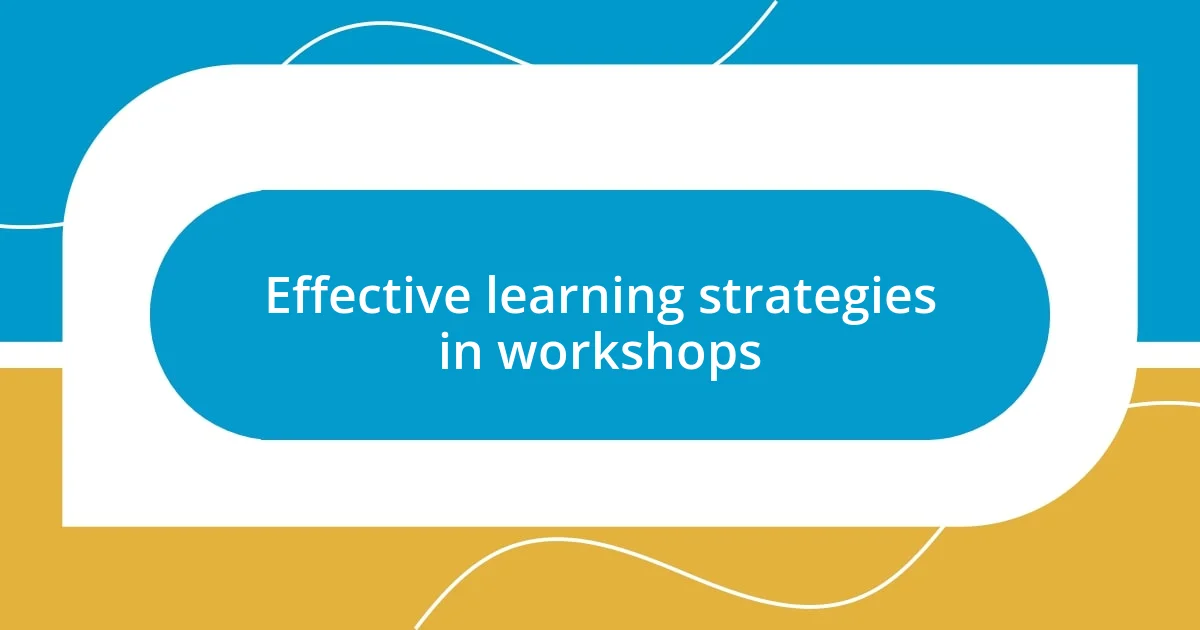
Effective learning strategies in workshops
When participating in coding workshops, I discovered that actively engaging with the material is key. I remember a moment during one workshop when I hesitated to ask a question, thinking it might be too basic. But once I finally spoke up, not only did my understanding deepen, but several others shared similar concerns. It struck me how vital it is to foster an open environment where everyone feels free to ask questions—this kind of engagement can truly enhance the learning experience.
Here’s a list of effective strategies I found to be incredibly beneficial during my workshops:
- Ask Questions: Don’t be afraid to seek clarification; it often leads to deeper insights for everyone.
- Participate Actively: Be involved in discussions and activities. The more you engage, the more you learn.
- Pair Programming: Working alongside another participant allows you to exchange ideas and approaches.
- Take Breaks for Reflection: Periodically pause to think about what you’ve learned, ensuring it sticks with you.
I’ve also found that setting specific goals before attending a workshop can significantly enhance my focus. For instance, in one session, I decided I wanted to master a particular coding challenge. This intent not only kept me aligned during the exercises, but it also motivated me to seek out additional resources to fill gaps in my learning. I vividly recall that fulfilling sense of accomplishment when I finally tackled the challenge, feeling proud of the progress I made in such a short time.
Incorporating the following strategies can profoundly impact your learning journey in workshops:
- Establish Clear Goals: Knowing what you want to achieve keeps your learning focused.
- Take Notes: Jot down essential points and personal reflections during the workshop.
- Practice After the Workshop: Reinforcing what you’ve learned by coding outside the workshop helps solidify your knowledge.
- Seek Feedback: Ask for critiques from peers or instructors to gain new perspectives on your work.
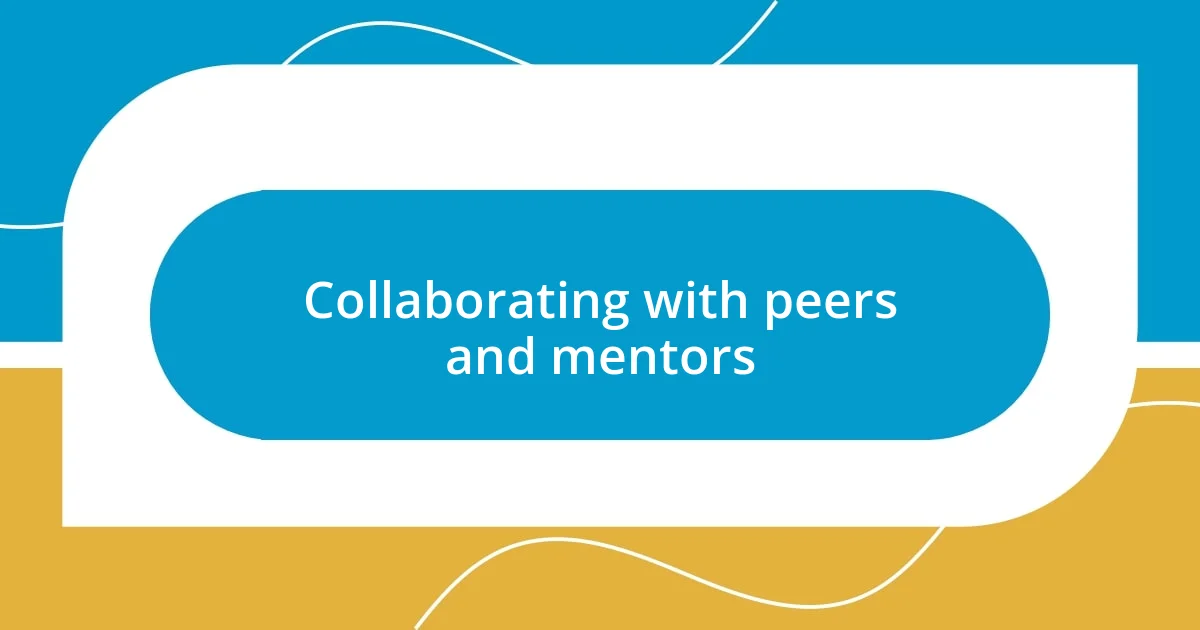
Collaborating with peers and mentors
During coding workshops, the collaboration with peers and mentors transformed my learning experience into something truly dynamic. I vividly remember a moment when a mentor provided feedback on my code. It was like a lightbulb went off—suddenly, I could see the nuances I’d previously missed. Have you ever had someone’s perspective change how you approached a problem? It’s remarkable how collaboration can uncover insights we wouldn’t find alone.
Working closely with peers is equally rewarding. I recall a time when I teamed up with a classmate to tackle a particularly complex algorithm. We spent hours brainstorming and bouncing ideas off each other. The excitement was palpable as we cracked the code together. This experience taught me that diverse viewpoints often lead to innovative solutions. Have you felt the thrill of that kind of teamwork? I believe it’s where the magic of learning happens.
Lastly, interacting with mentors encouraged me to step out of my comfort zone. One mentor challenged me to present my project to the group, which terrified me at first. However, the support and encouragement I received was invaluable. It made me realize that constructive feedback is not just about critique, but about nurturing growth. This kind of collaboration fosters a community where everyone feels safe to learn and evolve. Isn’t it incredible how collaboration can build confidence and unlock potential?
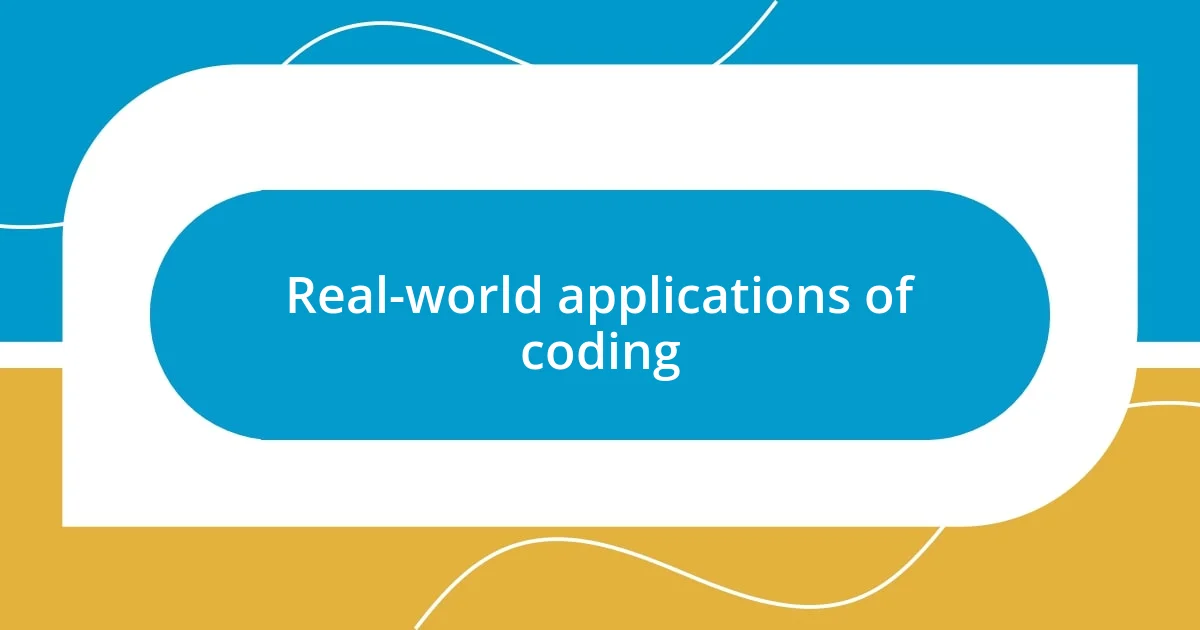
Real-world applications of coding
Coding has real-world applications that extend far beyond the classroom. I remember when I first applied coding skills in a volunteer project, creating a simple website for a local charity. The sense of fulfillment I felt seeing my work help others made me realize how coding can create tangible change in communities. Have you ever thought about how your skills could impact local organizations? It’s a powerful idea.
Moreover, I’ve found that coding is not just about writing code; it’s about problem-solving. In one workshop, we simulated a hackathon where we tackled a real-world issue—developing an app to help users reduce energy consumption. Collaborating with others to devise practical solutions opened my eyes to the flexibility of coding as a tool for innovation. It was exhilarating to see our ideas merge into an actual product. Isn’t it fascinating how coding can turn abstract concepts into solutions that resonate with everyday life?
In addition, the ability to automate mundane tasks has personally transformed my workflow. I once created a script to manage my daily to-do list, freeing up a significant amount of time. The relief of not having to juggle reminders in my head was worth a few hours of coding! I often wonder how many other daily frustrations can be solved through simple coding solutions. It’s moments like these that illuminate the true power of programming in optimizing everyday tasks and enhancing productivity.
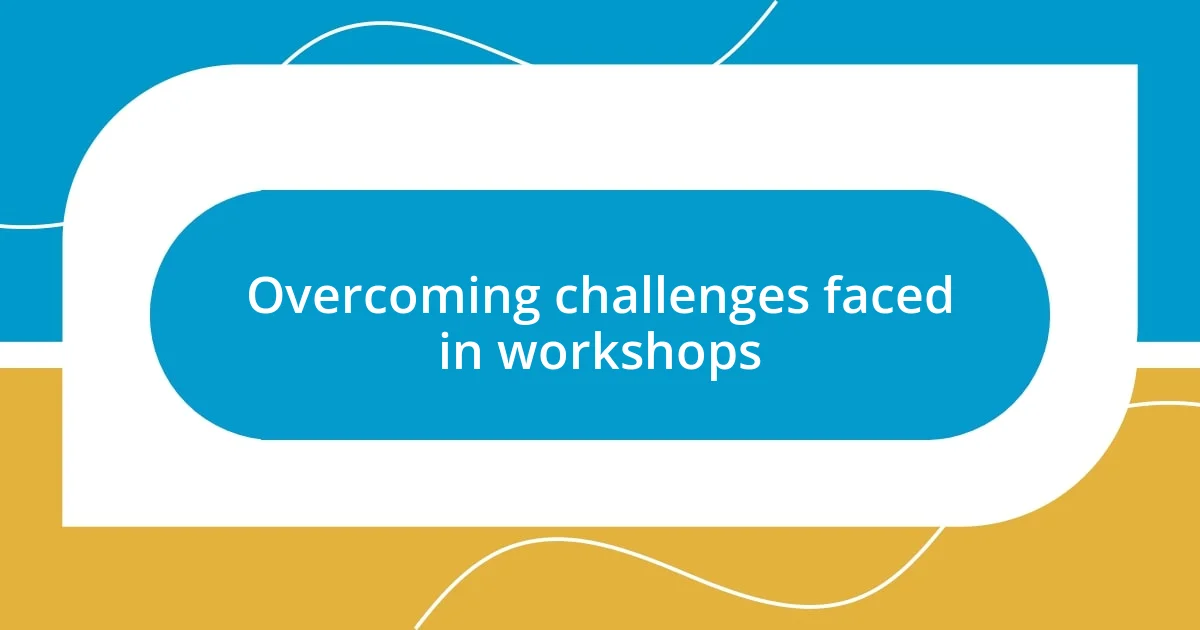
Overcoming challenges faced in workshops
Sometimes, you walk into a coding workshop feeling overwhelmed, and that’s completely normal. I remember attending one session where the instructor started discussing advanced topics that made my head spin. I felt lost, but instead of giving in to frustration, I took a deep breath and asked questions. That moment taught me that vulnerability is okay—asking for help isn’t a weakness; it’s a stepping stone to growth.
Another challenge I faced was time management. During a particularly intensive workshop, I struggled to keep up with the pace of coding exercises. I caught myself anxiously glancing at the clock, wondering if I would finish on time. I decided to reach out to a fellow participant to form a study group. Sharing knowledge helped me grasp concepts more effectively while also creating lasting friendships. Have you ever formed a connection out of necessity? It’s fascinating how collaboration can turn stress into solidarity.
Lastly, tackling imposter syndrome was a battle I frequently encountered. I’d often hear voices in my head questioning my skills, especially when surrounded by more seasoned coders. One day, after sharing my feelings with a mentor, I was surprised to learn that even they had struggled with similar doubts during their journey. That conversation opened my eyes to the fact that everyone experiences setbacks and doubts. I realized it was essential to shift my mindset to view challenges as opportunities for growth. How liberating is it to discover that you’re not alone in your struggles?
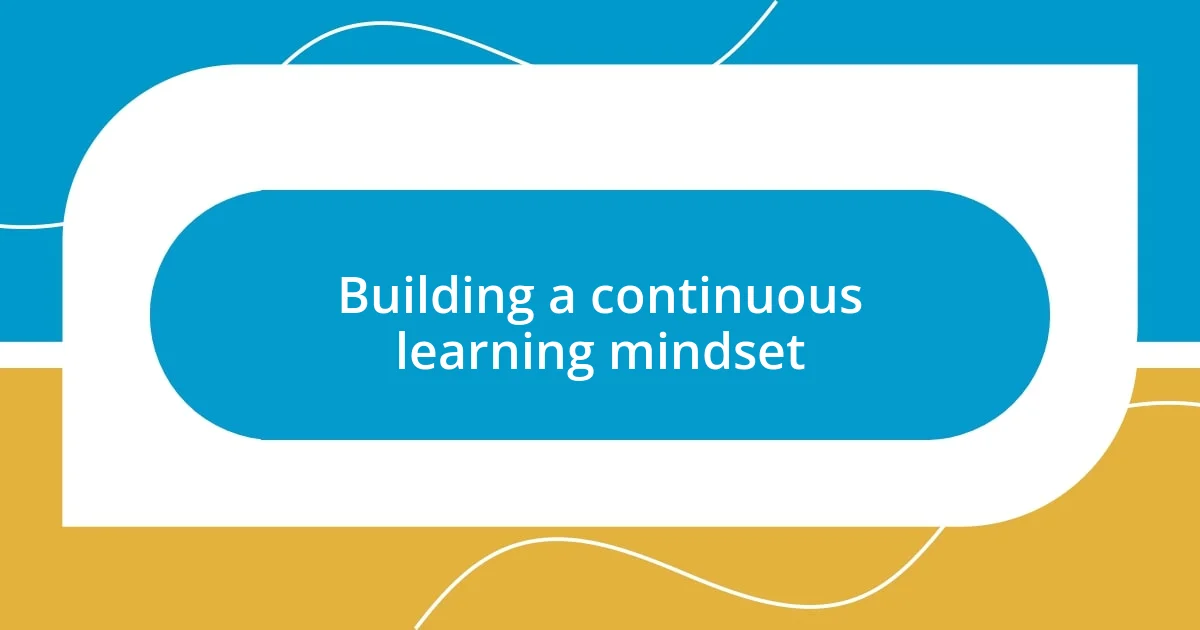
Building a continuous learning mindset
Building a continuous learning mindset is a game-changer in the world of coding. I distinctly remember the first workshop where I encountered this concept. The instructor encouraged us to embrace failure as part of the learning process. Initially, I felt hesitant, thinking failure was something to avoid. However, I soon realized that each misstep brought valuable lessons, which kept me motivated to push my boundaries. How liberating is it to see setbacks as stepping stones rather than obstacles?
As I dove deeper into coding, I began to see every project as an opportunity for growth. For instance, there was a time when I struggled with using a new framework. Rather than shying away, I decided to fully immerse myself in learning it. I watched tutorials, read documentation, and even reached out to others who were more knowledgeable. That experience ignited a passion for self-improvement that I still carry today. Have you ever taken a leap into the unknown, only to find a new passion waiting for you?
To nurture a continuous learning mindset, I’ve started setting small, achievable goals. Celebrating these little victories, like mastering a new coding concept or completing a project, fills me with a sense of accomplishment. I find that this approach keeps my enthusiasm alive, allowing me to tackle more significant challenges down the road. What small steps can you take today that might lead to exciting discoveries tomorrow? It’s a rewarding journey, each step unveiling new possibilities.








